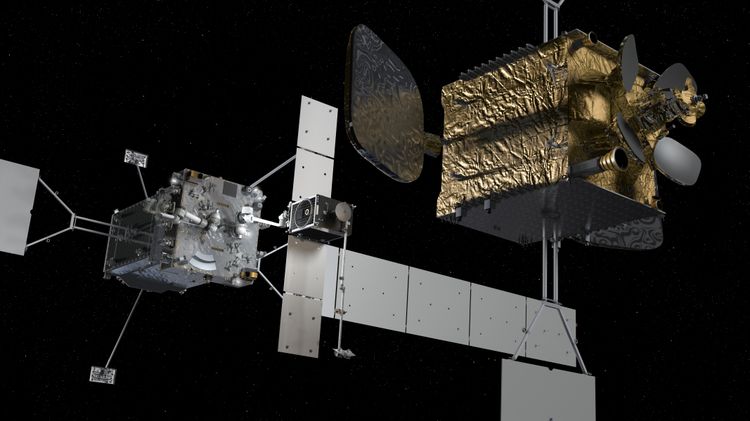Latest News

The SpaceLogistics Mission Robotic Vehicle uses its sophisticated robotics to attach Mission Extension Pods. Photo: SpaceLogistics/Northrop Grumman
Northrop Grumman subsidiary SpaceLogistics sold its first Mission Extension Pod (MEP), the next generation of satellite servicing vehicles. Australian satellite operator Optus has agreed to purchase an MEP for its D3 satellite in 2025, the companies announced Tuesday.
Separately, SpaceLogistics signed a launch agreement with SpaceX for a planned spring 2024 launch of the Mission Robotic Vehicle (MRV) and several MEPs.
The MRV will perform a series of on-orbit tests of its robotic-arm payload as it carries out its primary mission, installing MEPs on commercial satellites. The MEP, is a small customer-owned, customer-controlled propulsion augmentation device that can provide six years of life extension for a typical 2,000 kg satellite in Geostationary Orbit (GEO).
Optus said the MEP will extend the life of its D3 satellite, launched in 2009. D3 is a Ku-band satellite that provides fixed communications and direct television broadcasting services for Australia and New Zealand.
“Our contracts with SpaceX and Optus are tangible evidence of our momentum and commitment to deliver second-generation on-orbit servicing technologies to the satellite industry.” said Vice President of Business Development for SpaceLogistics Joseph Anderson. “We are thrilled to have Optus as our premier MEP customer as we continue pioneering the future of space and expanding the realm of what is possible with on-orbit servicing and sustainment.”
The MRV and MEP follow SpaceLogistics’ Mission Extension Vehicle, which has been successfully demonstrated twice, first with Intelsat 901 in 2020, and with Intelsat 10-02 in 2021. Anderson said in the release that the Optus contract is the third service contract with commercial satellite providers for life-extension services. He said SpaceLogistics has several signed term sheets in queue and the installation manifest for MEPs is already full for 2025 and nearly full for 2026.
The MRV and MEP completed their preliminary design reviews in fall 2021 and remain on schedule for critical design reviews in 2022 and launch in 2024.
Get the latest Via Satellite news!
Subscribe Now